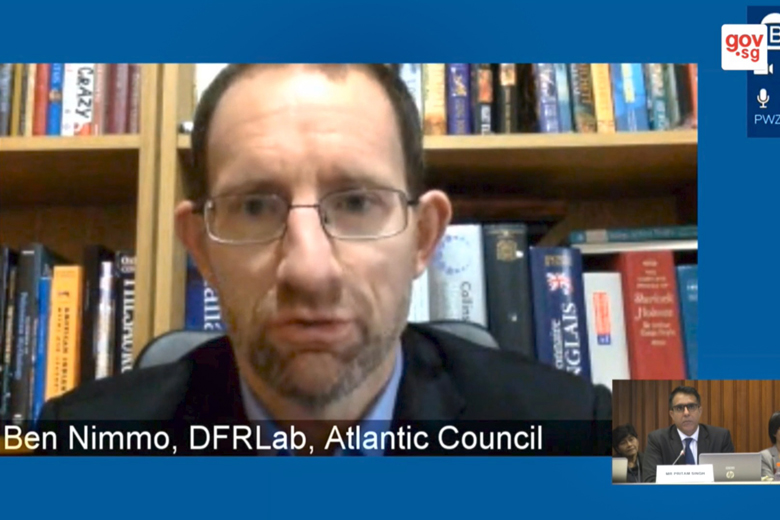Debate over how to determine deliberate online falsehood
Sign up now: Get ST's newsletters delivered to your inbox

Instead of legislation, Mr Ben Nimmo suggested a direct hotline for the authorities to reach social media companies.
PHOTO: GOV.SG
Lester Hio
Follow topic:
A British academic and Law and Home Affairs Minister K. Shanmugam had a spirited debate yesterday over whether falsehoods can be defined easily.
Mr Ben Nimmo, a senior fellow at American think-tank Atlantic Council, said there are so many shades of grey that a law to tackle the problem of deliberate online falsehoods would likely have a preamble as big as the Oxford English Dictionary.
"How do you define the problem? What if it is 5 per cent true? Is it still a false story? Is it deliberate?" asked Mr Nimmo, who analyses disinformation and fake news at the think-tank's Information Defence Digital Forensic Research Lab. "There are so many grey areas here, in terms of the spectrum, from a story that is 100 per cent made up, to 50 per cent made up, to not made up at all."
But Mr Shanmugam disagreed.
"I beg to differ with you in this sense that there are items which are completely manufactured and totally untrue, which are legally very easily identifiable," he said.
Mr Nimmo, who spoke via video conferencing, said legislation should be used as a last resort.
Workers' Party MP Pritam Singh, a committee member, had first raised the issue when he asked Mr Nimmo if he was proposing legislation as a way to get social media platforms to remove false content.
He was referring to Mr Nimmo's written submission to the committee, which said governments should engage with platforms like Facebook and Twitter to shut down disinformation networks. Mr Nimmo said: "No, I am not proposing that. I am very wary of any legislative proposal, anywhere in the world, which will allow politicians to order social platforms to change the content on their platforms. Because the precedent for countries hostile to democracy would be very, very alarming."
Instead, he suggested a direct hotline for the authorities to reach social media firms and get them to take action when there is a spread of disinformation. Such a solution had worked for him personally. When there was false news of his death on Twitter last August, he went directly to Twitter to get thousands of automated accounts shut down.
But this may not work for all, argued Mr Shanmugam. "In the United States, I suppose you can talk it out. But what about other countries, when they talk to these large international platforms, what if they say no to you? To a country like Singapore? What do we do?"
He added that legislation may not be the only solution, and there might be different solutions for differentiated outcomes.
Mr Nimmo said if social media platforms did not agree to cooperate, "that is when you can start thinking about legislation", adding that it is within Singapore's purview to introduce legislation.
But he said that international cooperation usually takes time and that direct cooperation might lead to quicker responses.
Public hearings to fight online falsehoods: Read the submissions here.

